- Home
- Cory Doctorow
Pirate Cinema Page 2
Pirate Cinema Read online
Page 2
“I know,” I said. “I know. I’ll just—” I waved my hands. I’d got that far a hundred times in the night, I’d just— Just what? Just apologize to Universal Pictures and Warner Brothers? Call the main switchboard and ask to speak to the head copyright enforcer and grovel for my family’s Internet connection? It was ridiculous. Some corporate mucker in California didn’t give a rat’s arse about my family or its Internet access.
“You won’t do shit,” she said. She stood up and marched to her room. Before she closed the door, she turned and skewered me on her glare: “Ever.”
* * *
I left home two weeks later.
It wasn’t the disappointed looks from my old man, the increasing desperation of the whispered conversations he had with Mum whenever finances came up, or the hateful filthies from my adoring little sister.
No, it was the film.
Specifically, it was the fact that I still wanted to make my film. There’s only so much moping in your room that you can do, and eventually I found myself firing up my lappie and turning back to my intricate editing project that had been so rudely interrupted. Before long, I was absolutely engrossed in deflowering Scot Colford. And moments after that, I realized that I needed some more footage to finish the project—a scene from later in Bikini Trouble when Monalisa was eating an ice-cream cone with a sultry, smoldering look that would have been perfect for the post-shag moment. Reflexively, I lit up my downloader and made ready to go a-hunting for Monalisa’s ice-cream scene.
Of course, it didn’t work. The network wasn’t there anymore. As the error message popped up on my screen, all my misery and guilt pressed back in on me. It was like some gigantic weight pressing on my chest and shoulders and face, smothering me, making me feel like the lowest, most awful person on the planet. It literally felt like I was strangling on my own awful emotions, and I sat there, wishing that I could die.
I scrunched my eyes up as tight as I could and whispered the words over and over in my mind: want to die, want to die. If wishing could make you pop your clogs, I would have dropped dead right there in my bedroom, and there they’d have found me, slumped over my keyboard, eyes closed, awful whirling brain finally silent. Then they’d have forgiven me, and they could go back to the council and ask to have the net reconnected and Dad could get his job back and Mum could get her benefits again and poor Cora would be able to graduate with top marks and go on to Oxford or Cambridge, where all the clever clogs and brain-boxes went to meet up with all the other future leaders of Britain.
I’d been low before, but never low like that. Never wishing with every cell in my body to die. I found that I’d been holding my breath, and I gasped in and finally realized that even if I didn’t die, I couldn’t go on living like that. I knew what I had to do.
I had almost a hundred quid saved up in a hollow book I’d made from a copy of Dracula that the local library had thrown away. I’d sliced out a rectangle from the center of each page by hand with our sharpest kitchen knife, then glued the edges together and left it under one of the legs of my bed for two days so that you couldn’t tell from either side that there was anything tricky about it. I took it out and pulled my school bag from under the bed and carefully folded three pairs of clean pants, a spare pair of jeans, a warm hoodie, my toothbrush and the stuff I put on my spots, a spool of dental floss, and a little sewing kit Cora had given me one birthday along with a sweet little note about learning to sew my own bloody shirt buttons. It was amazing how easy it was to pack all this. Somewhere in the back of my mind, I’d always known, I think, that I’d have to pack a small bag and just go. Some part of my subconscious was honest enough with itself to know that I had no place among polite society.
Or maybe I was just another teenaged dramatist, caught up in my own tragedy. Either way, it was clear that my guilty conscience was happy to shut its gob and quit its whining so long as I was in motion and headed for my destiny.
No one noticed me go. Dinner had come and gone, and, as usual, I’d stayed away from the family through it, sneaking out after all the dishes had been cleared away to poach something from the cupboard. Mum was gamely still cooking dinners, though increasingly they consisted of whatever was on deepest discount at Iceland or something from the local church soup kitchen. She’d brought home an entire case of lethally salted ramen noodles in bright Cambodian packaging and kept trying to dress them up with slices of boiled eggs or bits of cheapest mince formed into halfhearted, fatty meatballs.
If they missed me at dinner, they never let on. I’d boil a cup of water and make plain noodles in my room and wash the cup and put it on the draining board while they watched telly in the sitting room. Cora rarely made it to dinner, too, but she wasn’t hiding in her room; she was over at some mate’s place, scrounging free Internet through a dodgy network bridge (none of the family’s devices had network cards registered to work on the estate network, so the only way to get online was to install illegal software on a friend’s machine and cable it to ours and pray that the net-gods didn’t figure out what we were up to).
And so no one heard me go as I snuck out the door and headed for the bus station. I stopped at a newsagent’s by the station and bought a new pay-as-you-go SIM for cash, chucking the old one in three different bins after slicing it up with the tough little scissors from the sewing kit. Then I bought a coach ticket to London Victoria terminal. I knew Victoria a bit, from a school trip once, and a family visit the summer before. I remembered it as bustling and humming and huge and exciting, and that was the image I had in my head as I settled into my seat, next to an old woman with a sniffle and a prim copy of the Bible that she read with a finger that traced the lines as she moved her lips and whispered the words.
The coach had a slow wireless link and there were outlets under the seats. I plugged in my lappie and got on the wireless, using a prepaid Visa card I’d bought from the same newsagent’s shop, having given my favorite nom de guerre, Cecil B. DeVil. It’s a tribute to Cecil B. DeMille, a great and awful director, the first superstar director, a man who’s name was once synonymous with film itself. The trip to London flew by as I lost myself in deflowering poor old Scot, grabbing my missing footage through a proxy in Tehran that wasn’t too fussed about copyright (though it was a lot pickier about porn sites and anything likely to cause offense to your average mullah).
By the time the coach pulled into Victoria, my scene was perfect. I mean perfect with blinking lights and a joyful tune P-E-R-F-E-C-T. All two minutes, twenty-five seconds’ worth. I didn’t have time to upload it to any of the YouTubes before the coach stopped, but that was okay. It would keep. I had a warm glow throughout my body, like I’d just drunk some thick hot chocolate on a day when the air was so cold the bogeys froze in your nose.
I floated off the coach and into Victoria Station.
And came crashing back down to Earth.
The last time I’d been in the station, it had been filled with morning commuters rushing about, kids in school blazers and caps shouting and running, a few stern bobbies looking on with their ridiculous, enormous helmets that always made me think of a huge, looming cock, one that bristled with little lenses that stared around in all directions at once.
But as we pulled in, a little after 9:00 P.M. on a Wednesday, rain shitting down around us in fat, dirty drops, Victoria Station was a very different place. It was nearly empty, and the people that were there seemed a lot … grimmer. They had proper moody faces on, the ones that weren’t openly hostile, like the beardie weirdie in an old raincoat who shot me a look of pure hatred and mouthed something angry at me. The coppers didn’t look friendly and ridiculous—they were flinty-eyed and suspicious, and as I passed two of them, they followed me with their gaze and the tilt of their bodies.
And I stood there in that high-ceilinged concourse, surrounded by the mutters and farts of the night people and the night trains, and realized that I hadn’t the slightest bloody idea what to do next.
* * *
What to do next. I wandered around the station a bit, bought myself a hot chocolate (it didn’t make the warm feeling come back), stared aimlessly at my phone. What I should have done, I knew, was buy a ticket back home and get back on a bus and forget this whole business. But that’s not what I did.
Instead, I set off for London. Real London. Roaring, nighttime London, as I’d seen it in a thousand films and TV shows and Internet vids, the London where glittering people and glittering lights passed one another as black cabs snuffled through the streets chased by handsome boys and beautiful girls on bikes or scooters. That London.
I started in Leicester Square. My phone’s map thought it knew a pretty good way of getting there in twenty-minutes walk, but it wanted me to walk on all the main roads where the passing cars on the rainy tarmac made so much noise I couldn’t even hear myself think. So I took myself on my own route, on the cobbeldy, wobbeldy side streets and alleys that looked like they had in the time of King Edward and Queen Victoria, except for the strange growths of satellite dishes rudely bolted to their sides, all facing the same direction, like a crowd of round idiot faces all baffled by the same distant phenomenon in the night sky.
Just then, in the narrow, wet streets with my springy-soled boots bounding me down the pavement, the London-beat shushing through the nearby main roads, and everything I owned on my back—it felt like the opening credits of a film. The film of Trent McCauley’s life, starring Trent McCauley as Trent McCauley, with special guest stars Trent McCauley and Trent McCauley, and maybe a surprise cameo from Scot Colford as the worshipful sidekick. And then the big opening shot, wending my way up a dingy road between Trafalgar Square and into Leicester Square in full tilt.
Every light was lit. Every square meter of ground had at least four people standing on it, and nearly everyone was either laughing, smoking a gigantic spliff, shouting drunkenly, or holding a signboard advertising something dubious, cheap, and urgent. Some were doing all these things. The men were dressed like gangsters out of a film. The women looked like soft-core porn stars or runway models, with lots of wet fabric clinging to curves that would have put Monalisa to shame.
I stood at the edge of it for a moment, like a swimmer about to jump into a pool. Then, I jumped.
I just pushed my way in, bouncing back and forth like a rubber ball in a room that was all corners and trampolines. Someone handed me a spliff—an older guy with eyes like a baboon’s arse, horny fingernails yellow and thick—and I sucked up a double lungful of fragrant skunk, the crackle of the paper somehow loud over the sound of a million conversations and raindrops. The end was soggy with the slobber of any number of strangers and I passed it on to a pair of girls in glittering pink bowler hats and angel wings, wearing huge “Hen Night” badges to one side of their deep cleavage. One kissed me on the cheek, drunken fumes and a bit of tongue, and I reeled away, drunk on glorious! London!
A film kicked out and spilled eight hundred more people into the night, holding huge cups of fizzy drink, wafting the smells of aftershave and perfume into the evenings. The tramps descended on them like flies, and they scattered coins like royalty before peasants. They were all talking films, films, films. The marquee said they’d been to see That Time We All Got Stupid and How Much Fun It Was, Wasn’t It? (the latest and most extreme example of the ridiculous trend to extralong film titles). I’d heard good things about it, downloaded the first twenty minutes after it played the festival circuit last year, and would have given anything to fall in alongside of those chattering people and join the chatter.
But it was a wet night, and they were hurrying for the road, hurrying to get in cabs and get out of the wet, and the next show let in, and soon the square was nearly empty—just tramps, coppers, men with signboards … and me.
The opening credits had run, the big first scene had concluded, the camera was zooming in on our hero, and he was about to do something heroic and decisive, something that would take him on his first step to destiny.
Only I had no bloody clue what that step might be.
* * *
I didn’t sleep at all that night. I made my way to Soho, where the clubs were still heaving and disgorging happy people, and I hung about on their periphery until 3:00 A.M. I ducked into a few all-night cafés to use the toilet and get warm, pretending to be part of larger groups so that no one asked me to buy anything. Then the Soho crowds fell away. I knew that somewhere in London there were all-night parties going on, but I had no idea how to find them. Without the crowds for camouflage, I felt like I was wearing a neon sign that read I AM NEW IN TOWN, UNDERAGE, CARRYING CASH, PHYSICALLY DEFENSELESS, AND EASILY TRICKED. PLEASE TAKE ADVANTAGE OF ME.
As I walked the streets, faces leered out of the dark at me, hissing offers of drugs or sex, or just hissing, “Come here, come here, see what I’ve got.” I didn’t want to see what they had. To be totally honest, I wanted my mum.
Finally, the sun came up, and morning joggers and dog-walkers began to appear on the pavements. Bleary-eyed dads pushed past me with prams that let out the cries of sleepless babies. I had a legless, drunken feeling as I walked down Oxford Street, heading west with the sun rising behind me and my shadow stretching before me as long as a pipe-cleaner man.
I found myself in Hyde Park at the Marble Arch end, and now there were more joggers, and cyclists, and little kids kicking around a football wearing trackies and shorts and puffing out clouds of condensation in the frigid morning. I sat down on the sidelines in the damp grass next to a little group of wary parents and watched the ball roll from kid to kid, listened to the happy sounds as they knackered themselves out. The sun got higher and warmed my face, and I made a pillow of my jacket and my pack and leaned back and let my eyes close and the warmth dry out the long night. My mind was whirling a thousand miles per hour, trying to figure out where I’d go and what I’d do now that I’d come to the big city. But sleep wouldn’t be put off by panic, and my tired, tired body insisted on rest, and before I knew it, I’d gone to sleep.
It was a wonderful, sweet-scented sleep, broken up with the sounds of happy people passing by and playing, dogs barking and chasing balls, kids messing around in the grass, buses and taxis belching in the distance. And when I woke, I just lay there basking in the wonder and beauty of it all. I was in London, I was young, I was no longer a danger to my family. I was on the adventure of my life. It was all going to be all right.
And that’s when I noticed that someone had stolen my rucksack out from under my head while I slept, taking my laptop, my spare clothes, my toothbrush—everything.
Chapter 1
ALONE NO MORE/THE JAMMIE DODGERS/POSH DIGS/ABSTRACTION OF ELECTRICITY
My “adventure” wasn’t much fun after that. I was smart enough to find a shelter for runaways run by a church in Shoreditch, and I checked myself in that night, lying and saying I was eighteen. I was worried that they’d send me home if I said I was sixteen. I’m pretty sure the old dear behind the counter knew that I was lying, but she didn’t seem to mind. She had a strong Yorkshire accent that managed to be stern and affectionate at the same time.
My bedfellows in the shelter—all boys, girls were kept in a separate place—ranged from terrifying to terrified. Some were proper hard men, all gangster talk about knives and beatings and that. Some were even younger looking than me, with haunted eyes and quick flinches whenever anyone spoke too loud. We slept eight to a room, in bunk beds that were barely wide enough to contain my skinny shoulders, and the next day, another old dear let me pick out some clothes and a backpack from mountains of donated stuff. The clothes were actually pretty good. Better, in fact, than the clothes I’d arrived in London wearing; Bradford was a good five years behind the bleeding edge of fashion you saw on the streets of Shoreditch, so these last-year’s castoffs were smarter than anything I’d ever owned.
They fed me a tasteless but filling breakfast of oatmeal and greasy bacon that sat in my stomach like a rock after they kicked me out into the streets. It was 8:00 A.M. and everyo
ne was marching for the tube to go to work, or queuing up for the buses, and it seemed like I was the only one with nowhere to go. I still had about forty pounds in my pocket, but that wouldn’t go very far in the posh coffee bars of Shoreditch, where even a black coffee cost three quid. And I didn’t have a laptop anymore (every time I thought of my lost video, never to be uploaded to a YouTube, gone forever, my heart cramped up in my chest).
I watched the people streaming down into Old Street Station, clattering down the stairs, dodging the men trying to hand them free newspapers (I got one of each to read later), and stepping around the tramps who rattled their cups at them, striving to puncture the goggled, headphoned solitude and impinge upon their consciousness. They were largely unsuccessful.
I thought dismally that I would probably have to join them soon. I had never had a real job and I didn’t think the nice people with the posh film companies in Soho were looking to hire a plucky, underage video editor with a thick northern accent and someone else’s clothes on his back. How the bloody hell did all those tramps earn a living? Hundreds of people had gone by and not a one of them had given a penny, as far as I could tell.
Then, without warning, they scattered, melting into the crowds and vanishing into the streets. A moment later, a flock of Community Support Police Officers in bright yellow high-visibility vests swaggered out of each of the station’s exits, each swiveling slowly so that the cameras around their bodies got a good look at the street.
I sighed and slumped. Begging was hard enough to contemplate. But begging and being on the run from the cops all the time? It was too miserable to even think about.

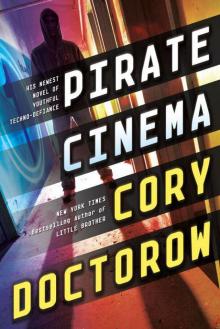 Pirate Cinema
Pirate Cinema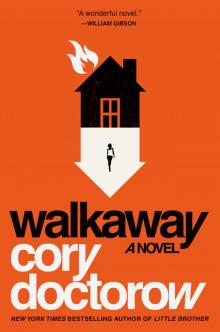 Walkaway
Walkaway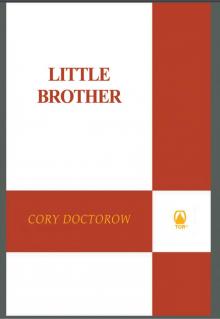 Little Brother
Little Brother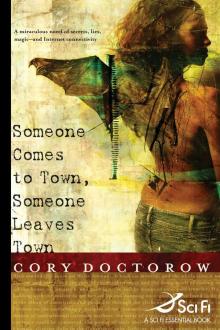 Someone Comes to Town, Someone Leaves Town
Someone Comes to Town, Someone Leaves Town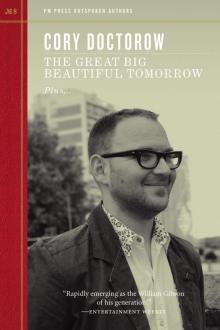 The Great Big Beautiful Tomorrow
The Great Big Beautiful Tomorrow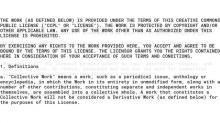 Super Man and the Bug Out
Super Man and the Bug Out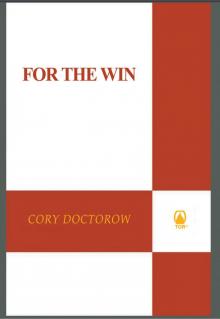 For the Win
For the Win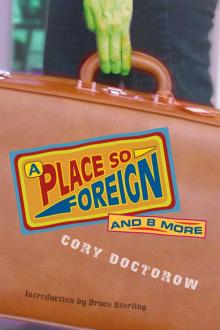 A Place so Foreign
A Place so Foreign Shadow of the Mothaship
Shadow of the Mothaship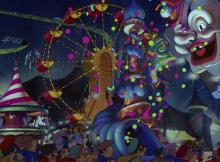 Return to Pleasure Island
Return to Pleasure Island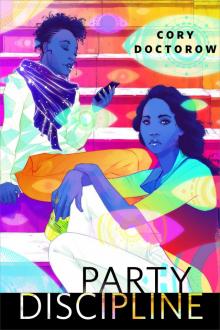 Party Discipline
Party Discipline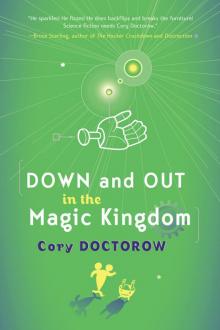 Down and Out in the Magic Kingdom
Down and Out in the Magic Kingdom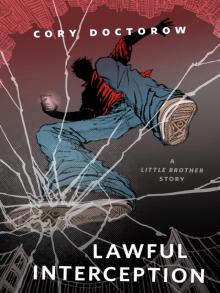 Lawful Interception
Lawful Interception Homeland
Homeland Eastern Standard Tribe
Eastern Standard Tribe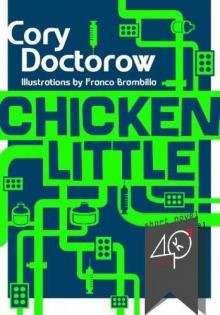 Chicken Little
Chicken Little I, Row-Boat
I, Row-Boat Makers
Makers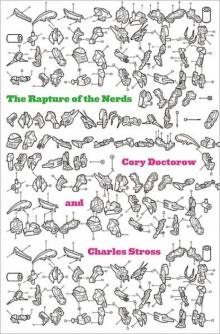 Rapture of the Nerds
Rapture of the Nerds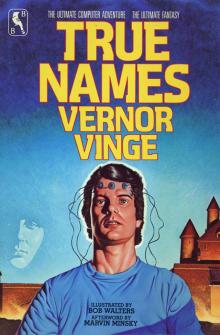 True Names
True Names